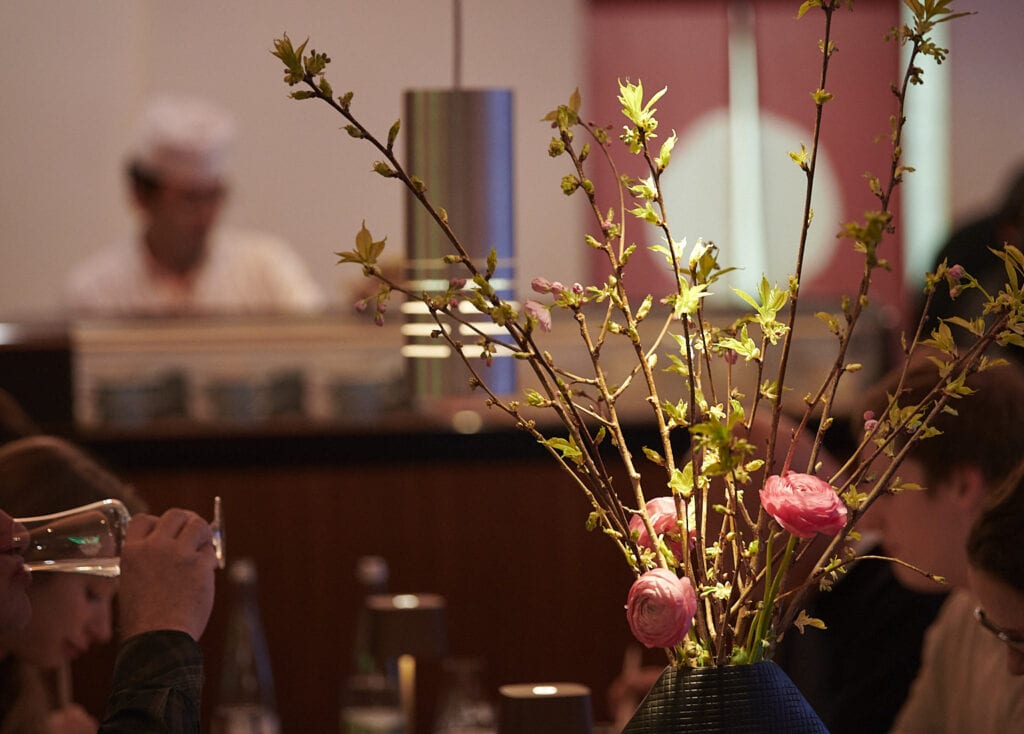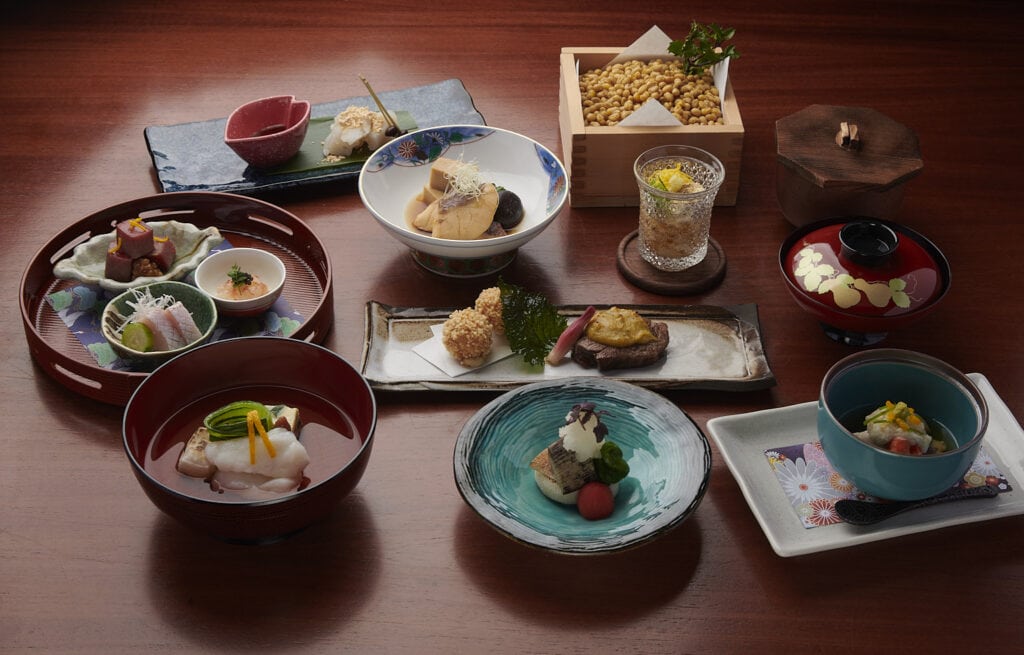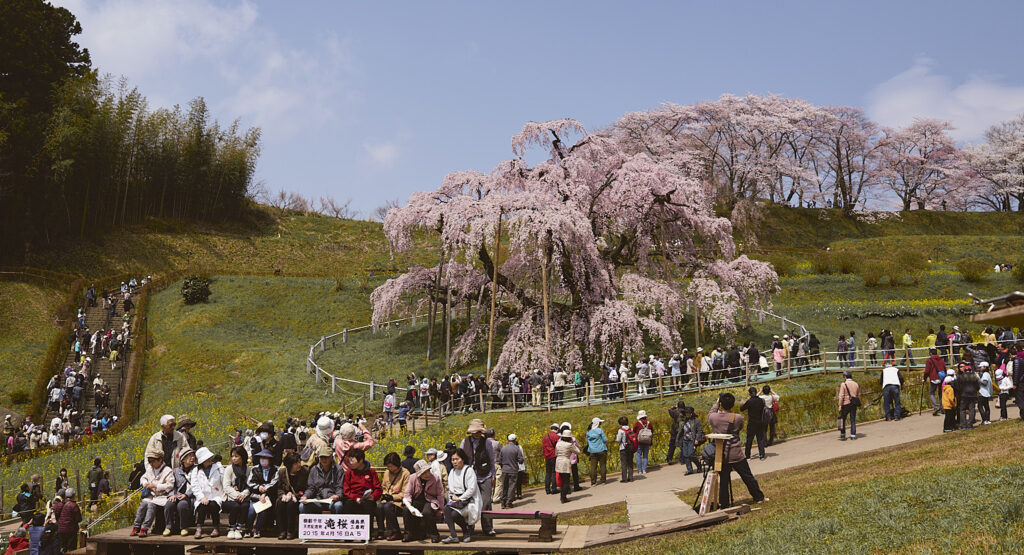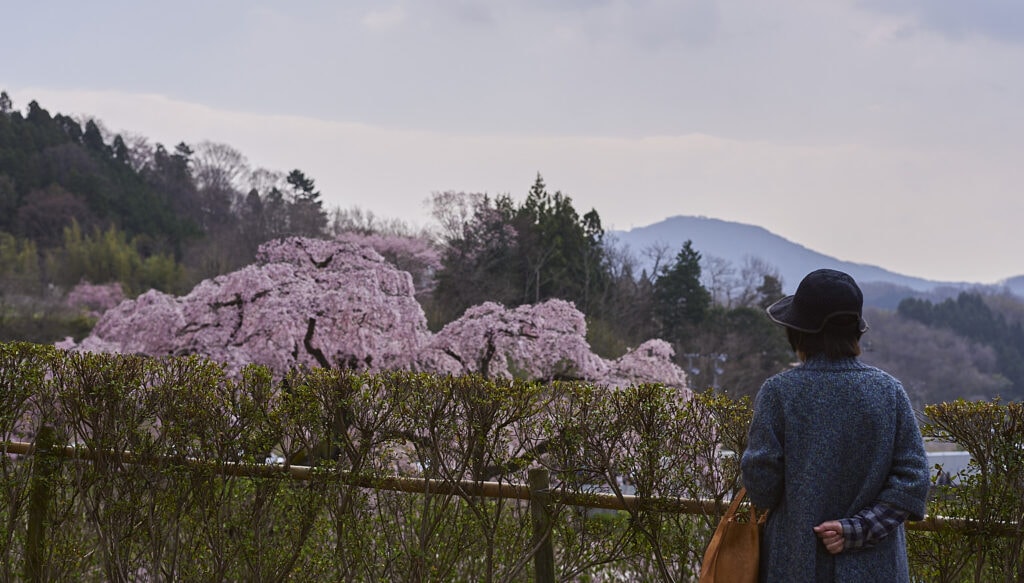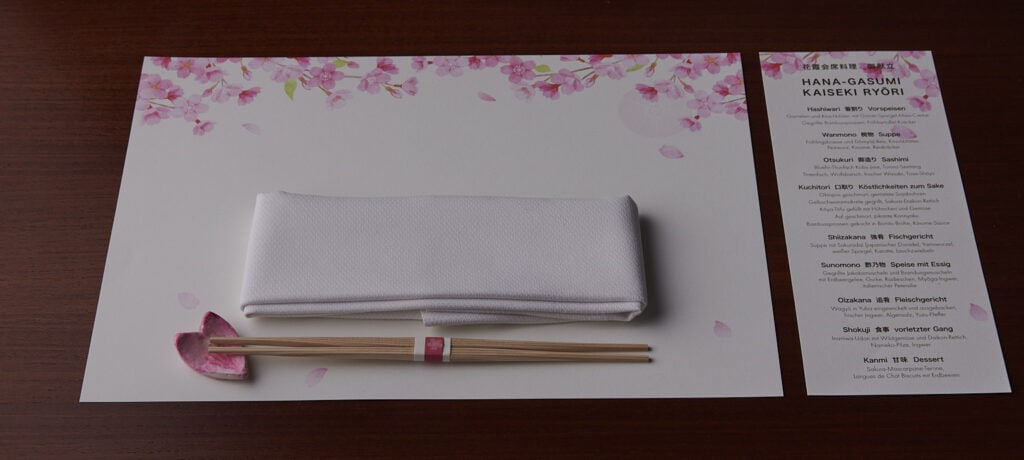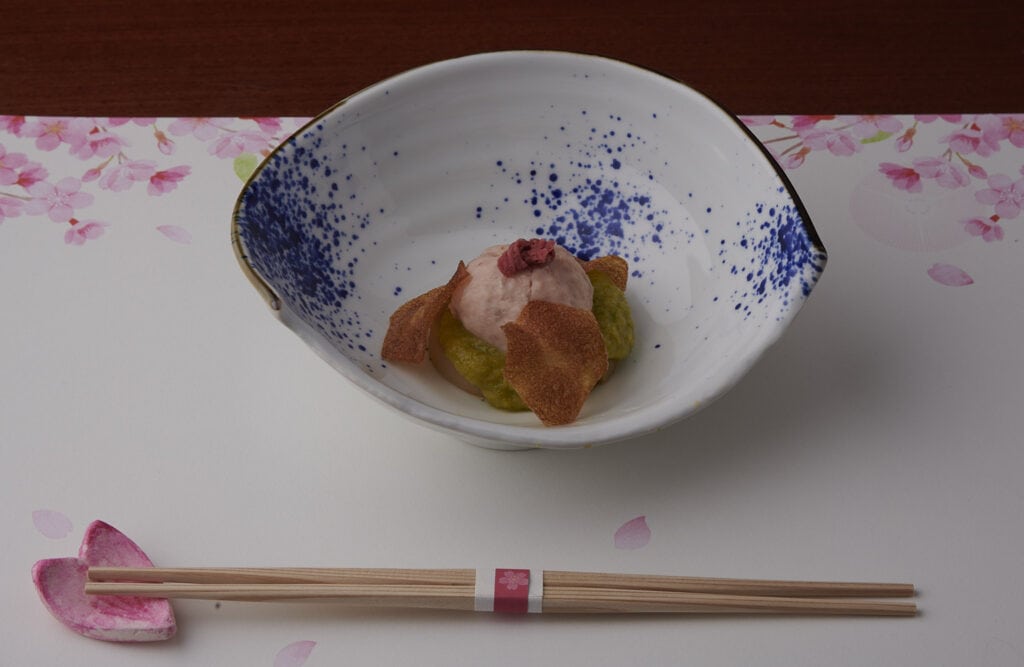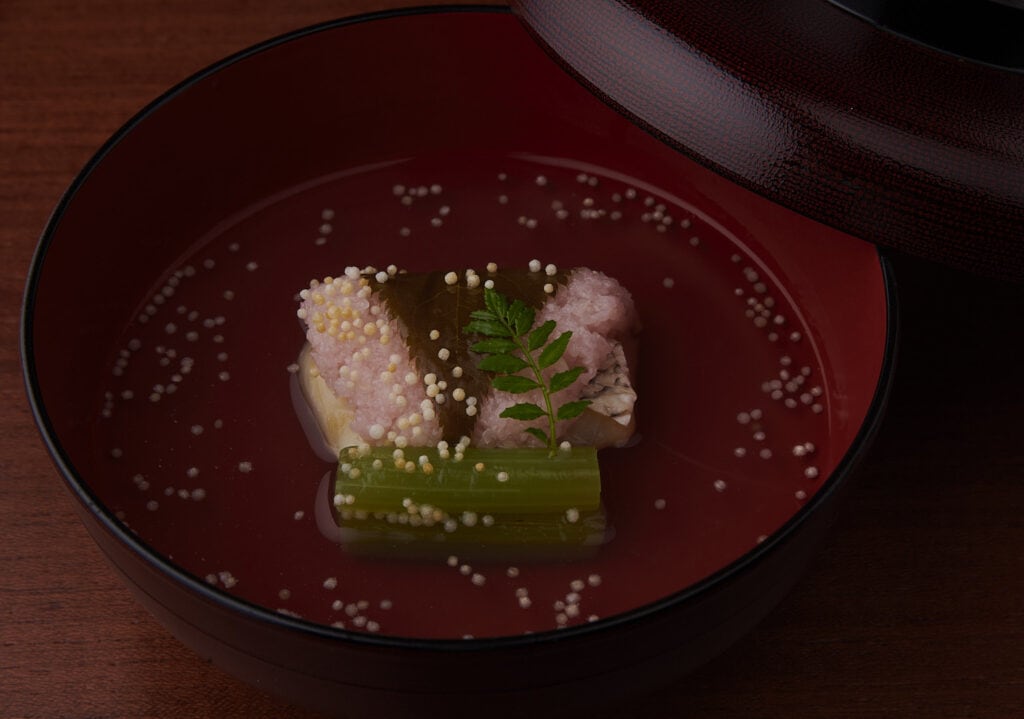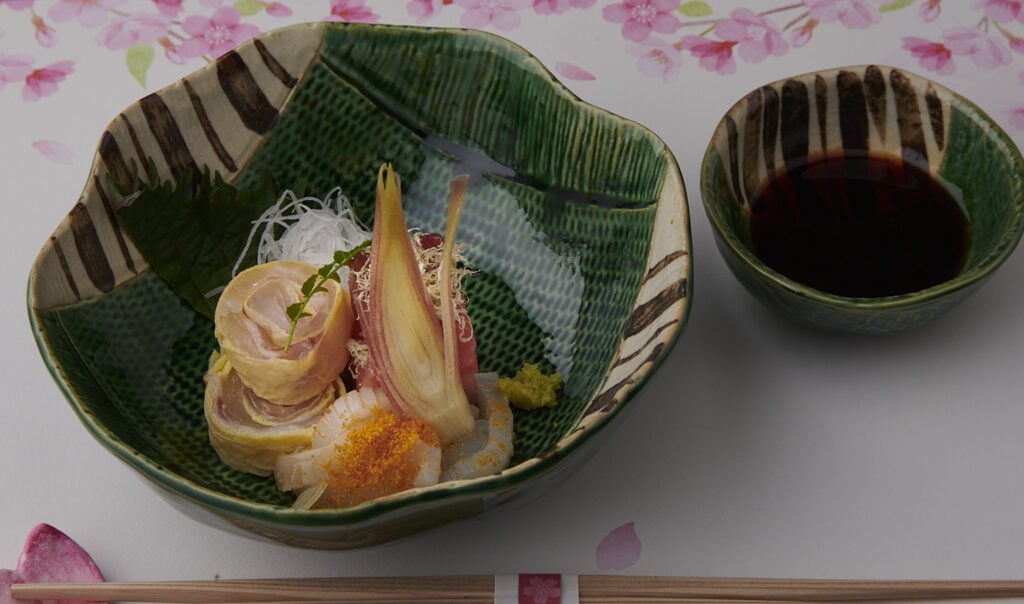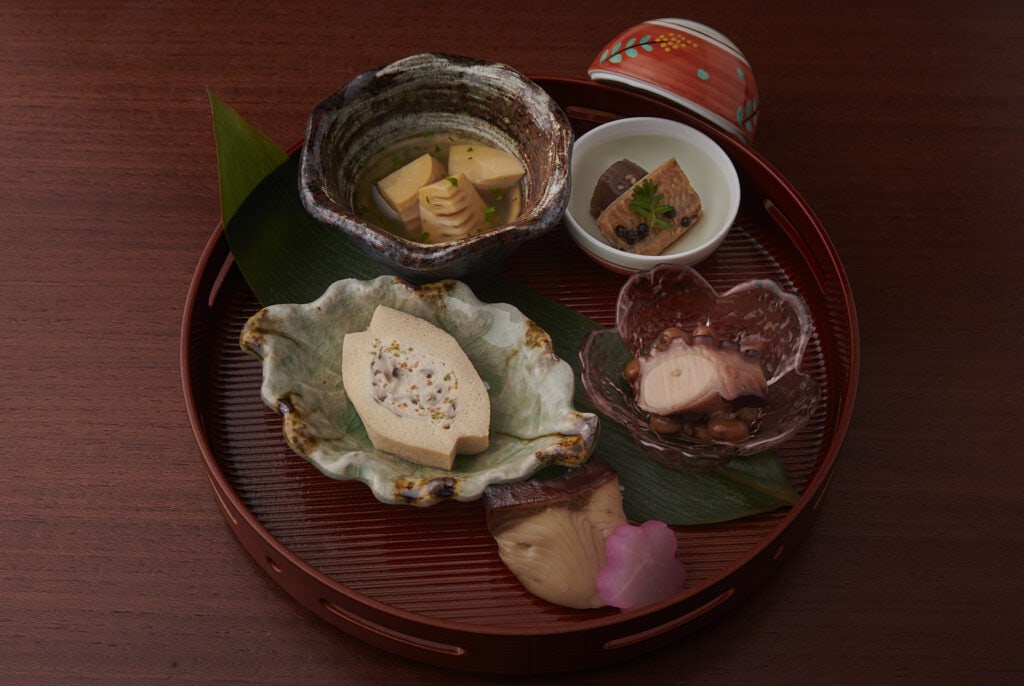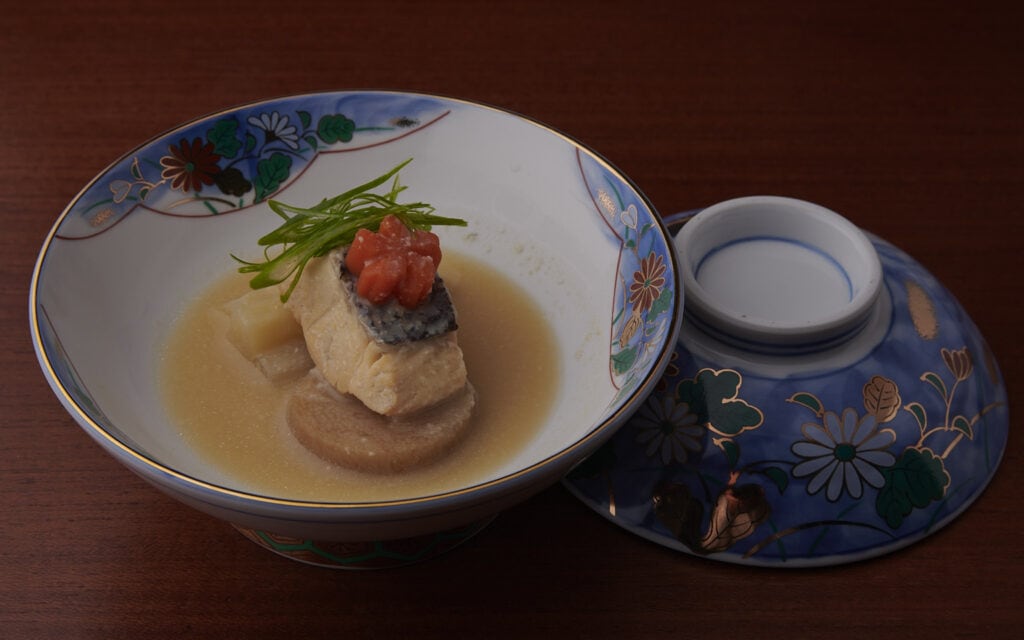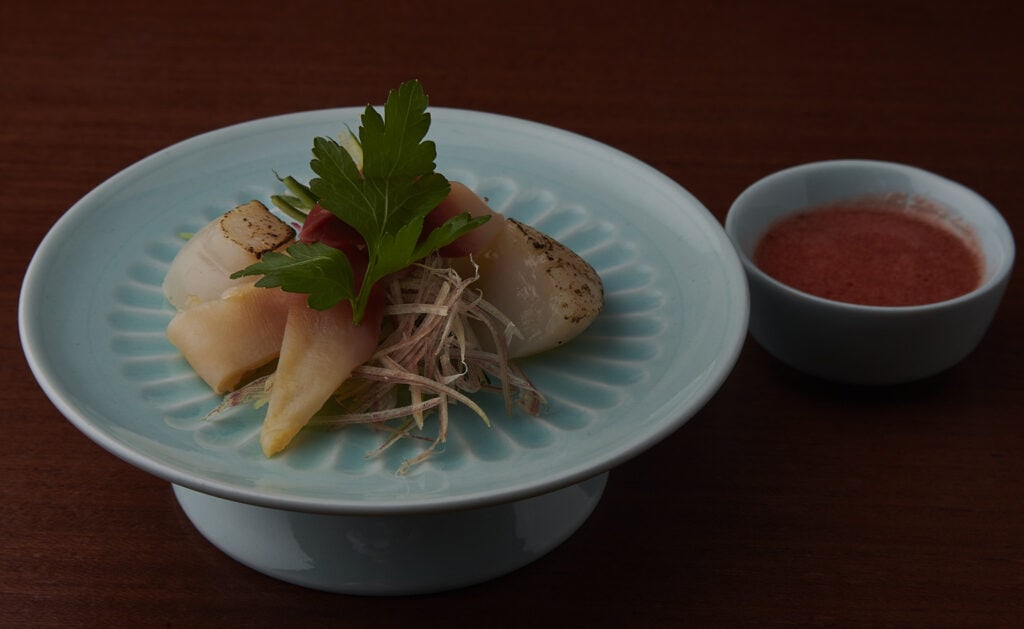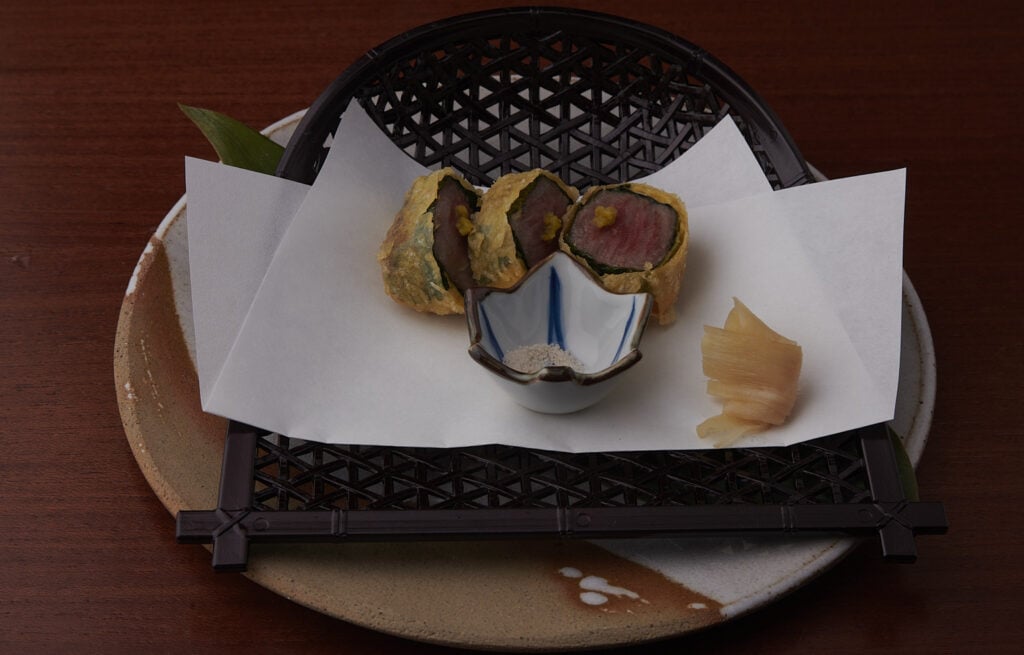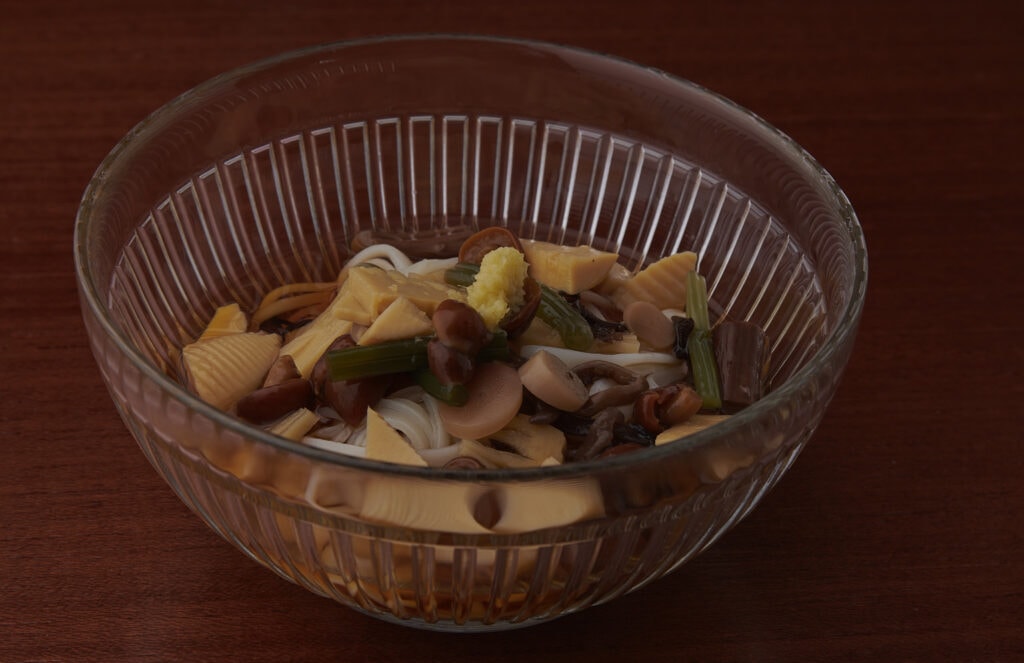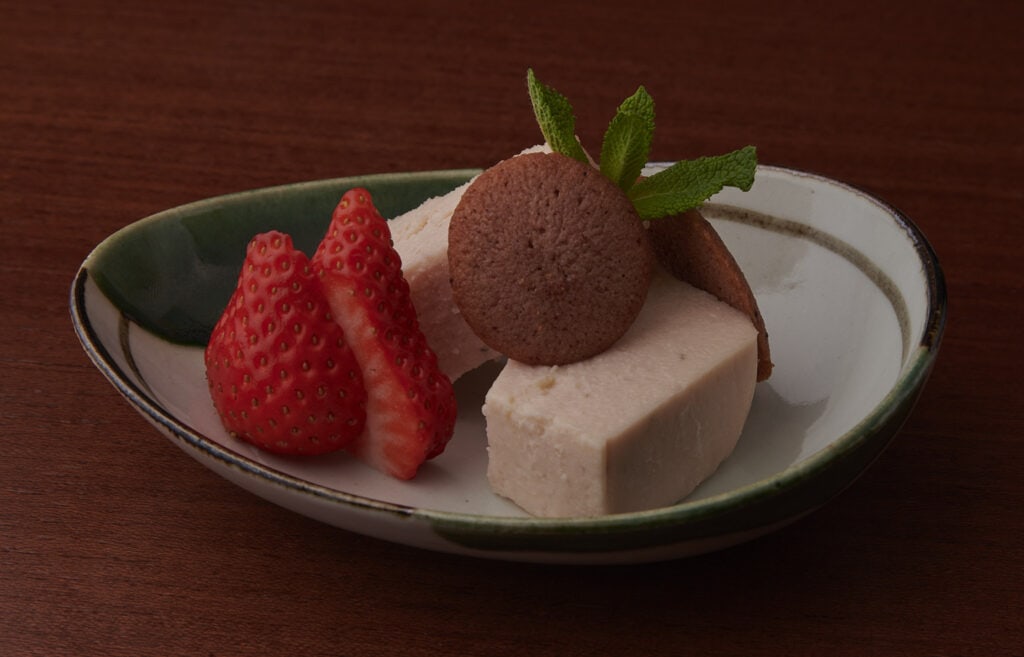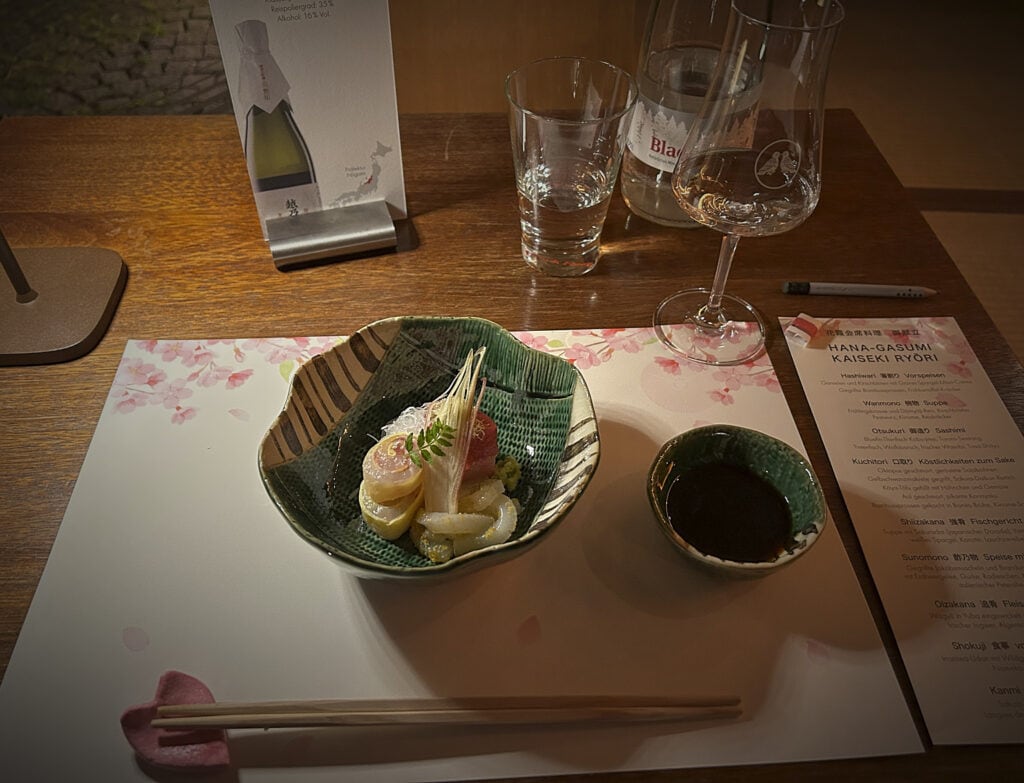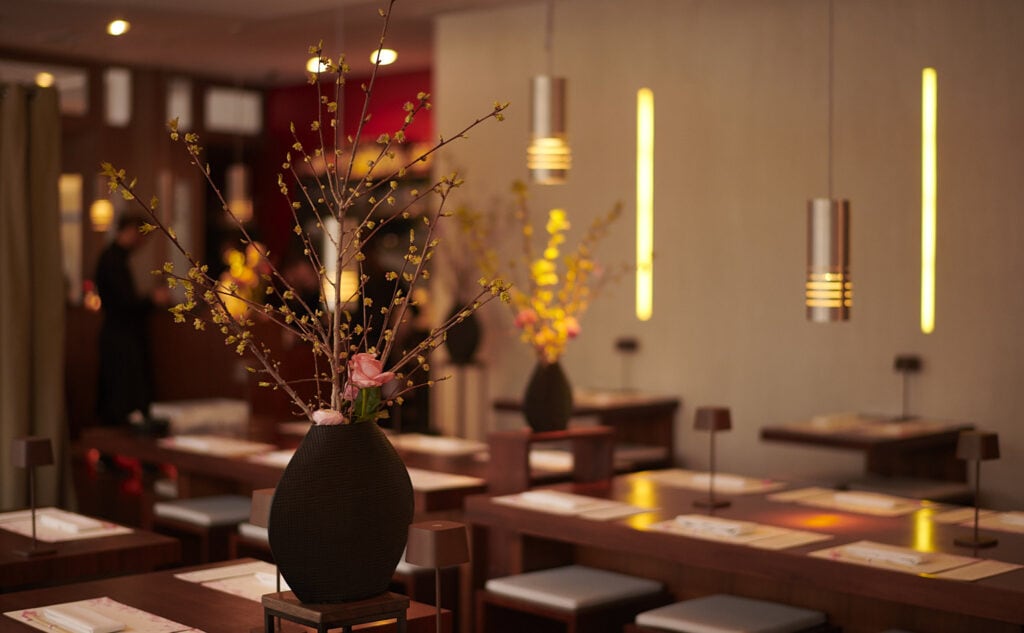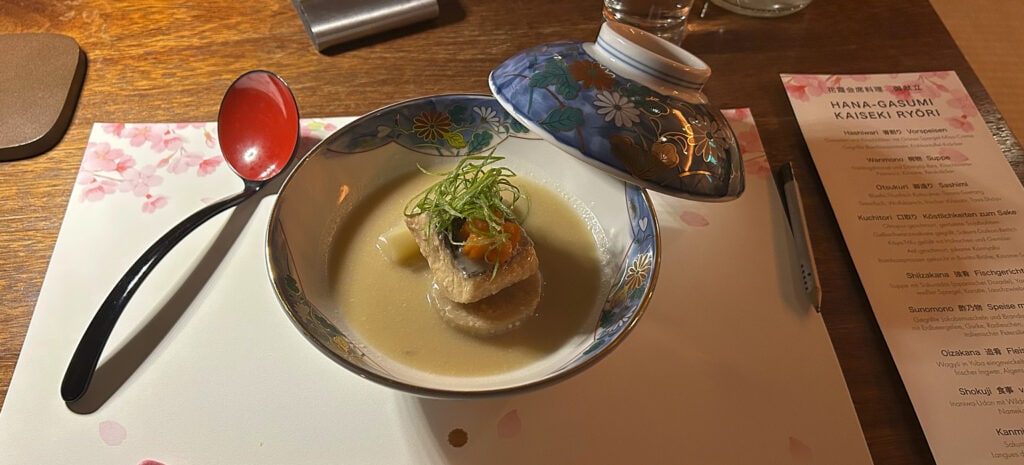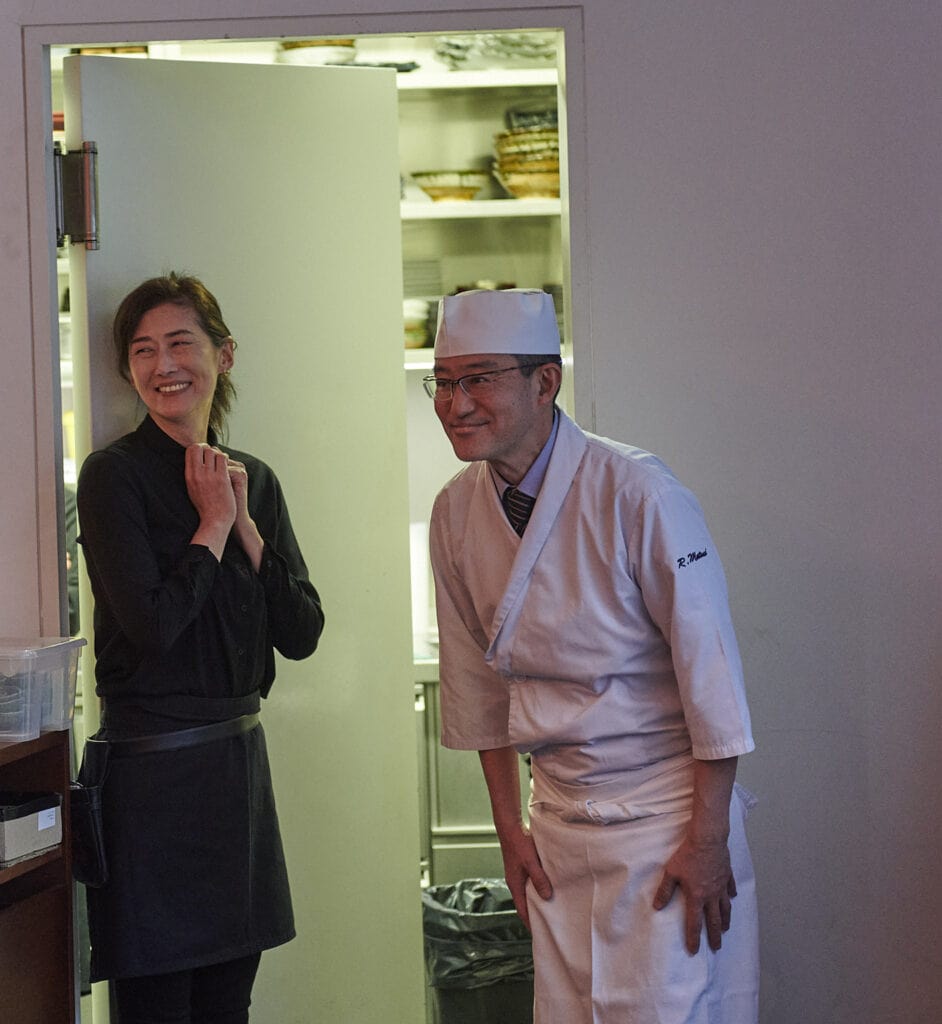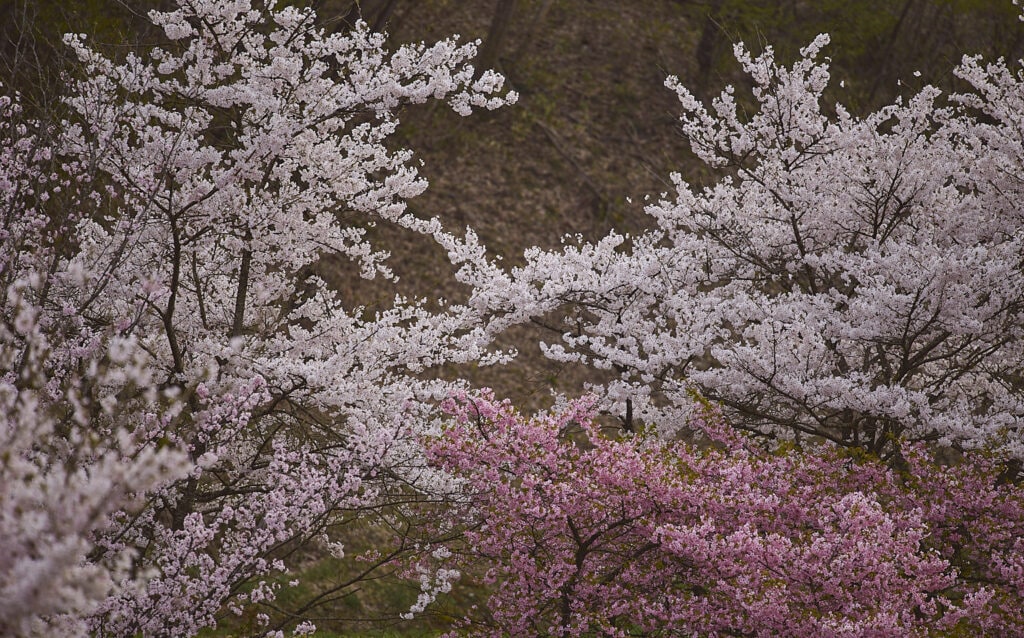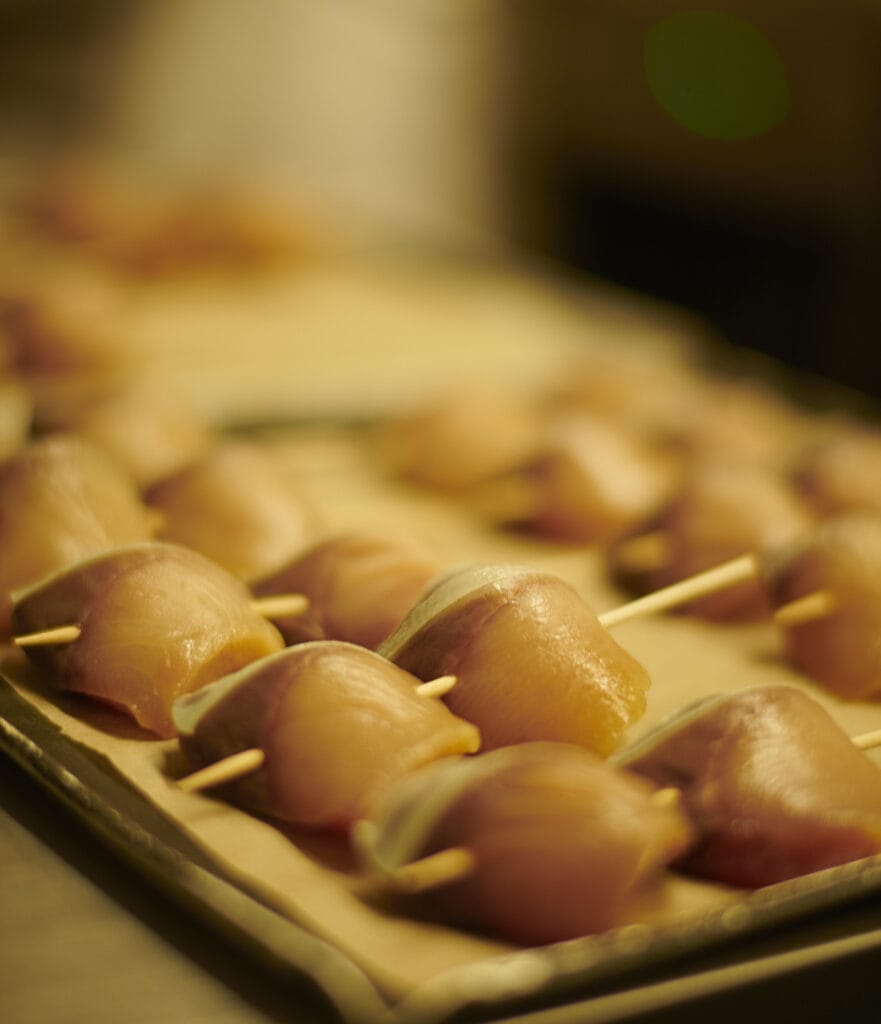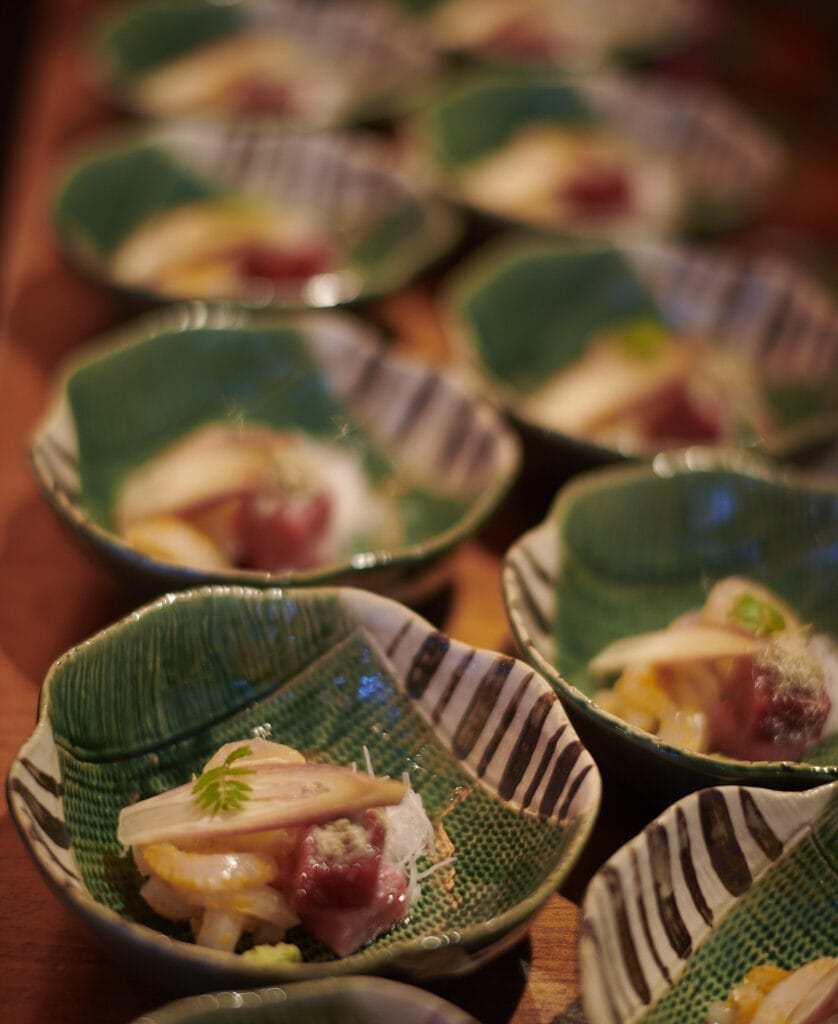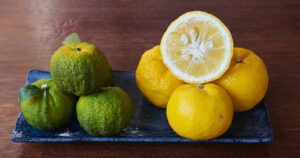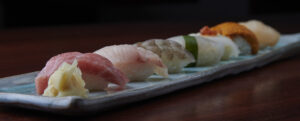It's only been a year since we approached the absolute Japanese haute cuisine with much humility and caution. Kaiseki in the full knowledge that genuine Kaiseki is rare in Germany and that we want to live up to our claim of translating the quality of Japanese cuisine authentically for our guests here in Munich.
A lot has happened in this one, seemingly short year - and we are grateful and proud that all the our previous Kaiseki events have received very generous praise, often from people who have a lot of experience with kaiseki in Japan or even star cuisine in Germany. For such praise - if from a competent mouth and sincerely meant - we are of course extremely grateful. It is a great motivation, because the price for such a menu can hardly outweigh the work in the background.
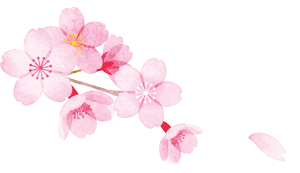
Spring Kaiseki 2023
Now the yearly circle closes and there is again a spring Kaiseki in the restaurant sansaro. And of course there will be a brand new menu again, what Chef Matsui has devised for this event.
Viewing the white splendor of cherry blossoms from a distance...

If you follow our blog closely (where there is a lot of information about Washoku, Kaiseki and Moritsuke and other topics), you already know that Japanese cuisine is a cuisine where "the eye eats first".
The formal design of the dishes has a significance that should please the eater - and so do the title and description of menus. The Japanese simply love food! One can even say that for the Japanese, the enjoyment of a dish begins the moment you read the menu and perceive the thoughts of the chef.
The name evokes an image
Take, for example, the title of a kaiseki menu: it is the summary of the chef's thoughts about the dish he wants to serve.
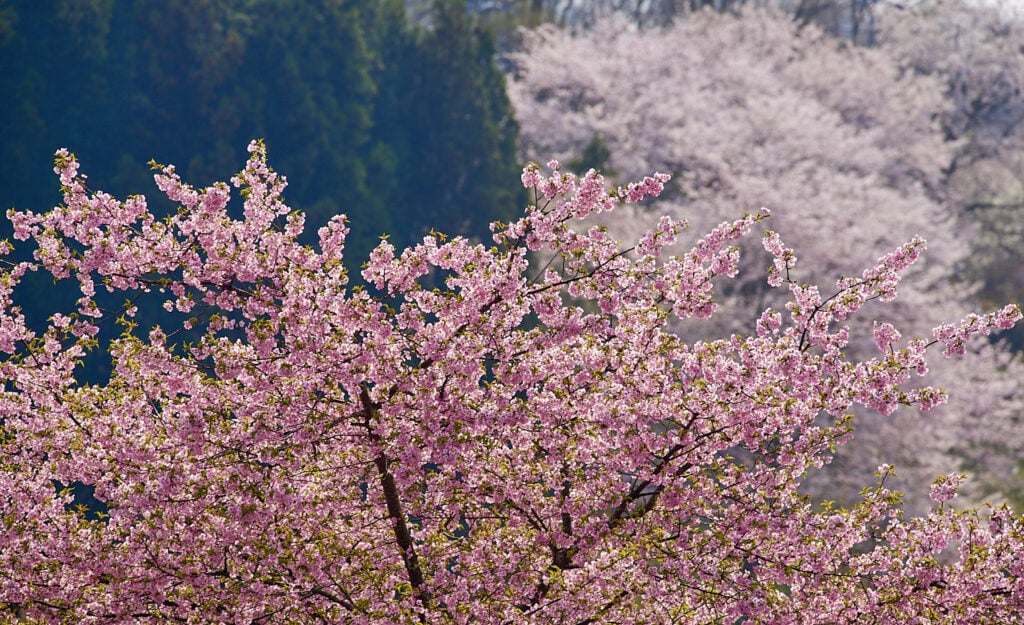
"Hana-Gasumi" (花霞) refers to the white splendor of cherry blossoms from afar. Just the term "Hana-Gasumi" makes the hearts of the Japanese beat faster, because in their mind's eye a corresponding image is formed for it, cherry blossoms spreading in the distance like a diffuse mist, behind which hides the promise of spring with all its droughts, shapes and colors.
Menu
HANA-GASUMI Kaiseki Ryōri
花霞会席料理 御献立

Hashiwari 箸割り appetizers
海老桜花真薯 アスパラガス白味噌掛け
焼き筒竹の子 新じゃが煎餅
- Ebi sakura shinjo with green asparagus miso cream
- Grilled bamboo shoots
- Early potato crackers
A shinjo is a kind of dumpling made here from steamed shrimp paste mixed with yams, egg whites and salted cherry blossoms. The elegant aroma of cherry blossoms is at the beginning of this kaiseki menu. Green asparagus, whose green fragrance reminds us of spring, is pureed with shiro miso paste, which adds sweetness and richness. Bamboo shoots are sliced into rounds for a soft texture.
Sake accompaniment Hashiwari:
Kozaemon Junmai Ginjō Sakura Label Origarami
With the first dish we serve a limited Namasake with cherry blossoms on the label, available only in spring. This sake is slightly cloudy due to the coarse filtration, and the floating turbidity is reminiscent of cherry blossom petals.
Wanmono 椀物 soup
真鯛と道明寺の桜椀
桜葉 蕗 木の芽 ぶぶ霰 吉野仕立て
- Yoshino style soup with spring bream and Dōmyōji rice wrapped with cherry leaves., Butterbur, kinome, rice crackers
A soup dish that captures the beautiful scene of the cherry blossom season in Japan.
Spring bream, also known as sakura-dai (cherry blossom bream), which we've featured on our blog before, is lightly grilled with salt, layered with steamed Dōmyōji flour, and tossed with cherry blossom petals in a clear soup thickened with kuzu flour.
Yoshino, a place in Nara Prefecture is famous for its kuzu flour, so the soup thickened with kuzu flour is called "Yoshino style". Yoshino is also famous for its cherry blossoms.
Bubuarare floating in the soup reminds "Hana-Ikada" (花筏):
In spring, the Japanese enjoy the beautiful sight of cherry blossoms floating on the river. This dish reflects that scene.
Sake accompaniment Wanomono:
Imayo Tsukasa Junmai Daiginjō
You will find the white bottle of this excellent sake pictured large in our menu box. Its subtle aroma, reminiscent of mochi and cotton candy, is in harmony with the delicate broth.
Otsukuri 御造り sashimi
鮪赤身とろろ昆布締め
烏賊の唐墨和え 鱸錦糸巻 生わさび 土佐醤油
Bluefin tuna kobu-jime, tororo seaweed
Squid with bottarga
Sea bass rolled in egg leaves
Fresh wasabi, Tosa-Shōyu
Sake accompaniment Otsukuri:
Koshi no Kanbai Kinmuku Junmai Daiginjō
The flagship sake from the legendary Koshi no Kanbai brewery in the Niigata region, which is known for its light, dry style. Again and again some bottles are imported exclusively for us to Germany, because we are big fans of the brewery Koshi no Kanbai. The subtle minerality of the "Kinmuku" combines harmoniously with the Sashimi.

Kuchitori 口取り delicacies with sake
蛸旨煮、炒り大豆
はまち西京焼き、桜甘酢大根
鶏肉と彩り野菜の高野射込み
鰻有馬山椒煮、蒟蒻辛煮
竹の子八方煮、木の芽銀餡
- Octopus braised in soy sauce, roasted soybean
- Yellowtail mackerel grilled with Saikyō miso, sakura daikon radish.
- Kōya-Tōfu stuffed with chicken and vegetables
- Eel braised with Sanshō pepper and soy sauce, pikante konnyaku
- Bamboo shoots cooked in bonito broth, kinome sauce.
The word "Kuchitori" describing this course is an abbreviation for the term "Kuchitori Sakana," which was originally served at the beginning of a kaiseki course and refers to the accompaniment to sake.
This time fish, meat and vegetables are colorfully arranged and served in the middle of the course.
Sake accompaniment Kuchitori:
Katsuyama En Tokubestu Junmai
A juicy sake with round umami enhances the flavor of a variety of dishes. The umami flavor is further enhanced by heating.
Shiizakana 強肴 fish dish
桜鯛の粕汁仕立て
長芋 白アスパラガス 桜人参 針青葱
- Sakuradai (Japanese dorado) in sake kasu soup, yam, white asparagus, carrot, spring onions.
Kasu-jiru (粕汁) is a soup dish made with sake kasu (酒粕, sake pomace), a byproduct of the Sake making made from unrefined sake. The subtle aroma and sweetness of the sake combined with the flavor of the seasoned ingredients create a unique savory taste. Red carrots in the shape of cherry blossoms float in the white broth. Sake kasu is also traditionally used as a condiment in Japan.
No sake is served with this course in order to bring out the full flavor of the sake kasu.
Sunomono 酢乃物 dish with vinegar
焼き帆立貝柱と北寄貝の苺酢ゼリー和え
三色野菜(胡瓜、ラディッシュ、茗荷)
苺 イタリアンパセリ
- Grilled scallops and surf clams with strawberry jelly
Cucumber, radish, Myōga ginger, Italian parsley
Sake accompaniment Sunomono:
Dassai Sparkling Junmai Daiginjō
Like champagne, this sake is produced by a second fermentation in the bottle. The fine bubbles and sweet and sour strawberry notes provide a pleasant refreshment.
Oizakana 追肴 meat dish
和牛の湯葉揚げ
大葉 新生姜甘酢漬け 藻塩 柚子胡椒
- Wagyū wrapped in yuba and baked out
Fresh ginger, moshio, yuzu pepper
Yuba is the thin layer that forms when soy milk is heated and is also known as Tōfuh skin. We serve a dish where Japanese A5-Wagyū beef is wrapped in this yuba and then fried.
The Moshio (藻塩) served with this dish is a salt extracted from seaweed. It is characterized by a mild flavor without sharp irritation, which is composed of the aroma of sea water and seaweed, and the taste of Wagyū-Rinds underscores.
The homemade pickled fresh ginger for Japanese also a typical spring dish.
Sake accompaniment Oizakana:
Yuho Junmai
A sake with rich umami and full-bodiedness emphasizes the umami of Wagyū beef.
Shokuji 食事 penultimate course
冷し山菜卸し稲庭うどん
なめこ茸 卸し生姜 麺出し
- Inaniwa udon with wild vegetables and daikon radish
Nameko mushrooms, ginger
Inaniwa Udon is a flat, thin udon noodle that originated in southern Akita Prefecture and is characterized by its bite, fine texture and elegant flavor. It has a 350-year history, and its production method and area are limited to Akita. This time it is served cold.
Traditionally, no sake is served with this course either.
Kanmi 甘味 dessert
桜チーズテリーヌ
苺のラング・ド・シャ
- Sakura mascarpone terrine
- Langues de Chat Biscuits with strawberries
The final course of this spring kaiseki is a mascarpone terrine with the rich aroma and color of cherry blossoms. It is served with cookies arranged in a kind of French pastry, langue de chat.
Sake accompaniment Kanmi:
Hōjicha
As part of the sake accompaniment, we serve a mild Japanese tea, a small sip to accent dessert.

Feedback on the Spring Kaiseki 2023
So far we have five Kaiseki Events organized.
A special praise for us is that this time again very many "repeat offenders" were found: a couple actually made it, all to attend our previous Kaiseki events. Others have been to one, two or in one case three of our Kaiseki events.
In addition to a lot of enthusiastic feedback, this time there was also some mixed feedback, which we received with thanks and interest, as always.
It turned out that the customers, who had a strong interest in Japanese culture, were completely thrilled that this kaiseki was again quite different from the others. Here, the menu was described as very balanced, an interesting way to enter the Japanese spring, some of which were innovative.
Japanese guest:
"Another wonderful evening, I have already sent an email of thanks and praise in Japanese to Chef Matsui!"
A Japanese pianist who has lived in Munich for a long time writes to us:
"Many, thank you very much for the wonderful Kaiseki evening yesterday!!!
It was all sensationally good and wonderful.....(…)
We actually got to feel a spring in Japan, taste it and enjoy it 100%ig.
It touched me very much...and even after the wonderful 9 gears I felt an incredible lightness...
Very big bravo to the boss and the whole Sansaro team!"
A German guest couple:
"After all, we've been to all of your Kaiseki events so far, and it's great that it tastes completely different every time!"
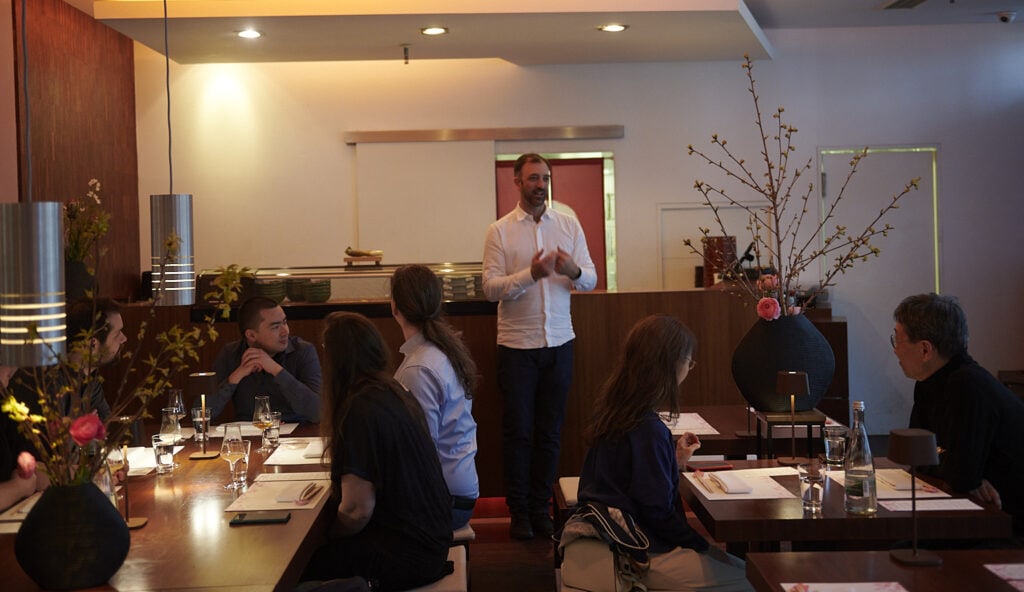
On the other hand, there were two pairs of guests who missed other highlights between sashimi & wagyu and were not as enthusiastic as last time. For example, critics found the combination of a slightly tart strawberry jelly with the mussels to be very problematic - while a passionate cook and food blogger was very excited about exactly this innovative combination.
We think that it is allowed to have different tastes and perspectives - and we are happy about the trust of all guests who were there on both evenings.
So, as always, we also gratefully and gladly accept critical feedback, but it also gives us a better understanding that our Kaiseki evenings are indeed authentic, culinary-cultural events.
Where expensive restaurants sometimes have a battle of materials, we happily stick to the expert composition and intricate craftsmanship of Chef Matsui and his team.
But most of all, we are very grateful that all the guests treated our efforts with respect and appreciation. Just as our chef put a lot of thought into all the details of the menu, our team worked with great love on the details from the layout of the placemats, to the floral decorations, to small cherry blossom shaped chopstick benches that we made ourselves spontaneously - and the guests noticed and praised exactly these details.
When will there be another Kaiseki event at sansaro?
Are you also interested in a Kaiseki event, but could not attend this time?
Would you like other events about Japanese cuisine or have special questions that the Internet does not answer?
Let us know via our contact form!
We are always happy to receive feedback.
And who subscribed to the newsletter will of course be the first to be informed when we have another Kaiseki event, a Sake Tasting or a Whisky Tasting or other events.
Thank you and see you soon at sansaro!
PS: From here on you will find only organizational notes in the article, which have become obsolete with the conclusion of the event, but will remain online for future orientation.

FAQ: Notes about your visit to the Kaiseki event
Our team intensively prepares everything for you: Decoration, food and drinks - everything should please your heart and your palate. So that we can succeed, here are a few hints to get you in the mood.
Get involved with all your senses.
From the composition of the menu, to the elaborate preparations, to the arrangement of all the dishes on the plates: the chefs take the greatest pains to create little works of art for you. Enjoy everything with care, first the sight and smell of the food, then the details. This way you will fully enjoy this special kitchen culture.

Japanese sake perfectly rounds off the taste experience of Kaiseki.
Our recommendation: choose our sake accompaniment to the kaiseki!
You do not have to make the decision regarding the sake accompaniment when booking, you can also decide on the spot in the evening. But of course you help us with the planning if we already know it when you make your reservation by clicking on the extra if necessary.

Please understand that we may not be able to provide individual Intolerances or allergies can only be taken into account by omitting a dish - unfortunately, it is not possible to build up an alternative for all possible concerns with such an elaborate menu.

The Kaiseki event is designed to allow the concentrated and at the same time serene perception of Japanese food. This requires a certain palate and also a certain discipline.
We therefore ask for your understanding that Dogs and children should not be present at the event - simply because you can't control whether a dog barks, a baby cries or a toddler gets cranky.
In our opinion, the event is not suitable for children under 14 years of age.

Bitte arrive on time at your booked time of 18.00h or 20.15h, as the entire kitchen operations depend on it.
We have a very small kitchen and for the delicate kaiseki, you can't re-produce/send the courses individually.
And we will be happy if you can make the occasion a appropriate clothing choose, expressing appreciation for the efforts of the chefs.

The seats at the Kaiseki are in great demand, the reservation is binding. Free cancellation possible until 7 days before the event - after that only if we can give the table to someone on the waiting list. As always, payment will be made on the spot in the evening.
If you can no longer get a table online, please write us an Message via the contact form with preferred date, number of persons, etc. - we will gladly put you on our waiting list and were able to make some guests happy this way last time!

Please also check your reservation data again - if there is any change in the number of persons, please let us know right away., as we often still have guests on the waiting list - perhaps someone else can then enjoy.
Above all, it would be a shame if seats were left empty, especially since the seat reserved for you is yours alone for the entire evening.

We are very much looking forward to your visit and hope that you will be as enthusiastic as the guests at our previous Kaiseki events.
For the future, please register in our newsletter, if you are not already - because the newsletter allows us to be the first to inform our interested guests about special events and menus. Thank you for your support and in many cases already 15 years of trust in our efforts around Japanese cuisine.
